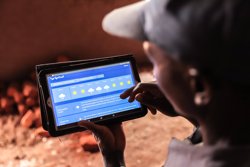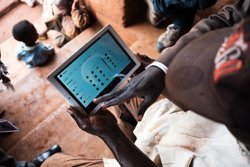A food systems approach connects 2.3 million people in Burundi
In Burundi a food systems approach connects 2.3 million people and service providers in rural service platforms, providing knowledge and eServices as a means to create a better life.
Written by: Dr. ir. Andre Jellema, Agricultural Programme Manager at Auxfin International, project lead GAP4A project. The views and opinions expressed in this blog are those of the author(s).
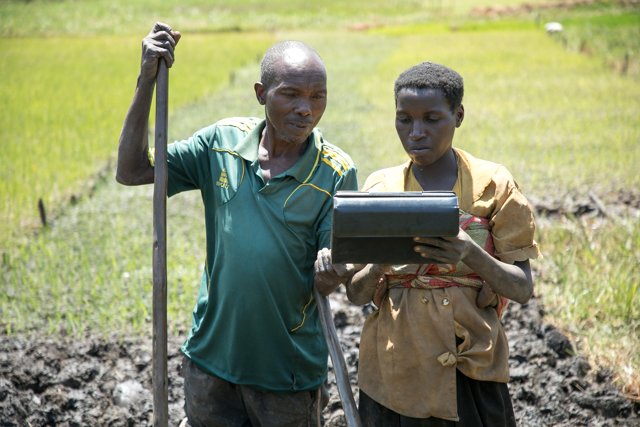
The challenges for smallholder farmers in Burundi to create enough and nutritious food for their families are manifold:
- Farmers are not aware of the nutrition value of their diet and the importance of food diversification;
- Farmers have limited access to fertilizers;
- No or limited access to the seeds market to grow new or improved crops, and seed multipliers are not aware which farmers would like to buy their seeds;
- Farmers do not have access to (agricultural) information to optimize their yields,
- Famers have limited capacity to safe money for fertilizers or seeds:
- No or limited access to financial services such as loans to buy fertilizers or seeds;
- Farmers only have access to local output markets to sell their crop at low prices;
- Farmers in a community act as individuals and are not able to organise themselves as a group to buy seeds and fertilizers collectively, to lend money and to define a shared future as a group due to distrust and a troubled history.
AUXFIN is solving these problems one by one in the G4AW GAP4A project by organising the farmers in groups of 50 (the G50) and connecting them to (agricultural) information and services. In the G50 approach, Farmers are organised in voluntary groups of maximum 50 households living close together. These groups choose three self-elected leaders as representatives for men, women, young, and old people. The groups get access to the information services, via a tablet and are invited to start working on their self-development goals using these digital tools. The group leaders are trained to govern this process and to ensure that the all group members, including unschooled or illiterate people can also benefit and are not left behind.
“I like the social side of it, where we get to help one another, there is less loneliness and we don’t have to struggle on our own. That is what I appreciate as a group leader and also as being part of the G50.’’ Marguerite from Rutoke-gr1 in Karusi
To assist the G50 groups in their self-development Auxfin and its partners provide information and services in four eCoach services: AgriCoach, NutritionCoach, HealthCoach, and FinanceCoach. The services range from work and income, finance, governance, health, education, to social services.
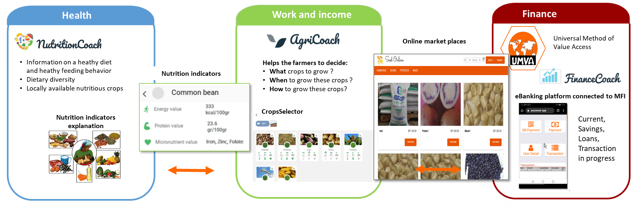
The AgriCoach
As an example, the AgriCoach provides information on:
- What crops to grow best at a certain location considering the local variables such as climate, topology, and soil. It also provides information on the market prices, nutritional value, crop varieties, and cultivation practices of the crops.
- When to plan the different agricultural activities, considering the agricultural calendar, weather, and seasonal forecasts.
- How to perform these practices to achieve higher yields in an environmentally sustainable way. Short videos in the local languages are used, taking the means of the farmer into account.
Satellite based weather information and the seasonal forecast is key in this application, it is updated on a daily basis.
The agent app and seed online market place enables farmers to order inputs directly from the suppliers. It is no longer needed to travel to pre-order and pre-pay the inputs as farmers can do it online. Some G50’s even managed to get their inputs delivered by the providers by placing a large order together. When using AgriCoach farmers started to sell their surplus to the market. After delivery and verification of the produce farmers get paid directly into their bank account.
"Before we had to go to COPEC the post office to pay advances to get fertilizers. That was difficult. We had to pay 20.000 for 2 sacks of fertilizers. We had to leave in the morning and could return at 8 in the evening. After that to collect the fertilizers, we would spend several days or even a week, before we could hand in the voucher and get the fertilizers. We appreciate what AUXFIN is doing. Now it is better, we can get the fertilizers easier, without waiting.” Agnès from Nyabwigungo-gr2 in Gitega”
NutritionCoach
The NutritionCoach provides information on food composition, diversification and recipes for crops that are available, nutritious, but less well known.
HealthCoach
The HealthCoach provides information and what preventive measures to take and how to treat for the most common diseases.
FinanceCoach
The FinanceCoach enables the farmers to start planning their financial needs for the coming seasons. For each member the platform provides access to an individual account connected to a bank account at a local micro-finance institute (MFI’s). This means that the group members can start saving, make transactions, and can receive credit at a distance.
"Before I was part of G50 and started saving, when I would get money, I would waste it on unnecessary things like spending it in the bar and using it unwisely. Now when I get 1,000 BIF (~$0.50) over time it becomes a lot. As before we would eat the money directly, we would never see the impact. Now we are setting it apart. That is beneficial. We are learning to save for things that we need.” Floride from Kindahwe-gr2 in Karusi
The current 8,000 G50 farmer groups are being organised in Burundi, connecting approximately 2.3 million people to the platform. The system is built in such a way that it can easily be scaled to other countries in the region where smallholder farmers are facing similar problems and challenges.
- Interested in learning more? Get in touch with Andre Jellema!
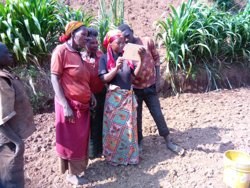
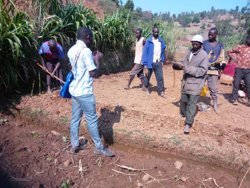
About the Food Systems Summit
On September 23rd 2021, UN Secretary-General António Guterres will convene a Food Systems Summit as part of the Decade of Action to achieve the Sustainable Development Goals (SDGs) by 2030. The Summit will launch new actions to deliver progress on all 17 SDGs, each of which relies to some degree on healthier, more sustainable and equitable food systems.
The term “food system” refers to the constellation of activities involved in producing, processing, transporting and consuming food. Food systems touch every aspect of human existence. The health of our food systems profoundly affects the health of our bodies, as well as the health of our environment, our economies and our cultures. When they function well, food systems have the power to bring us together as families, communities and nations.
Register here for the UN Food Systems Summit
Note to reader:
The G4AW programme has many projects worldwide with a wide-ranging variety of stakeholders. We occasionally invite partners to share their own experiences, best practices and insights via blogs on our website to inspire and inform our audience.
